Protección social
El informe sobre el Estado Global de los Programas de Transferencias Monetarias 2020 de la CALP Network muestra lo siguiente:
- Trabajar con, a través de y junto con los sistemas de protección social es ahora considerado esencial para fortalecer el nexo entre la ayuda humanitaria y el desarrollo. Los actores humanitarios son cada vez más activos en este espacio.
- Los profesionales encuentran que los tres grandes desafíos para la vinculación eficaz son los siguientes: (i) la falta de coordinación entre los actores involucrados, (ii) los sistemas de protección social no están diseñados para responder a las crisis humanitarias, (iii) los profesionales carecen de experiencia en la protección social.
- Fundamentalmente, no existe una solución de “talla única” para la vinculación de los PTM y la protección social. Se deben considerar compensaciones entre la eficiencia, la eficacia, la rendición de cuentas y la sostenibilidad para asegurar los mejores resultados para las personas que viven en situaciones de crisis, y esto depende del contexto, los sistemas existentes y los plazos. La vinculación no siempre será apropiada y los sistemas de protección social podrían no satisfacer todas las necesidades. En muchos contextos, en el corto a mediano plazo, al menos, la programación humanitaria será requerida para llenar los vacíos.
Prioridades actuales
La CALP Network ha invertido intensamente en esta área temática durante el último año. Continuaremos trabajando estrechamente con el subgrupo de trabajo del Gran Pacto en Protección Social y con el equipo de la plataforma de “Protección social en contextos de crisis” de socialprotection.org para desarrollar evidencia, producir materiales de aprendizaje y brindar apoyo técnico para los actores de coordinación.
Lectura adicional
-
El vínculo entre la protección social y los programas de transferencias monetarias (PTM) - Resumen de alto nivel, la CALP Network, 2020 (en inglés)
-
El vínculo entre la protección social y los PTM en la acción humanitaria
-
El vínculo entre la protección social y los PTM – ¿Qué sabemos realmente y por dónde empezamos? Hallazgos del documento informativo de alto nivel en tiempos de Covid-19 encargado por la CALP Network (en inglés)
-
El vínculo entre PTM y protección social en la region de Oriente Medio y Norte de África (MENA) – Hoja de repaso (en inglés)
-
El vínculo entre PTM y protección social en la region de Oriente Medio y Norte de África (MENA) – Caso de estudio del Líbano (en inglés)
-
El vínculo entre PTM y protección social en la region de Oriente Medio y Norte de África (MENA) – Caso de estudio de Iraq (en inglés)
-
El vínculo entre PTM y protección social en la region de Oriente Medio y Norte de África (MENA) – Caso de estudio de Yemen (en inglés)
-
El Estado de los Programas de Transferencias Monetarias 2020 – Capítulo 8: Vinculando los PTM y la protección social (en inglés)
Featured content

Linking CVA and Social Protection in the MENA Region – Crib sheet
Report
Building linkages between humanitarian cash and voucher assistance (CVA) and social protection (SP) has become an increasingly prominent topic over the past five years and the Middle East and North Africa (MENA) region has been at the centre of this evolution. The objective of this resource set (the crib sheet and 3, soon to be 6, regional case studies) is to ensure that the CALP Network...
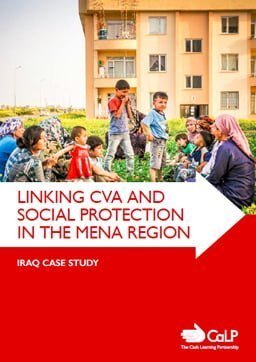
Linking CVA and Social Protection in the MENA Region – Iraq Case Study
Report
Building linkages between humanitarian cash and voucher assistance (CVA) and social protection (SP) has become an increasingly prominent topic over the past five years and the Middle East and North Africa (MENA) region has been at the centre of this evolution. The objective of this resource set (the crib sheet and 3, soon to be 6, regional case studies) is to ensure that the CALP Network...

Linking CVA and Social Protection in the MENA Region – Lebanon Case Study
Report
Building linkages between humanitarian cash and voucher assistance (CVA) and social protection (SP) has become an increasingly prominent topic over the past five years and the Middle East and North Africa (MENA) region has been at the centre of this evolution. The objective of this resource set (the crib sheet and 3, soon to be 6, regional case studies) is to ensure that the CALP Network...
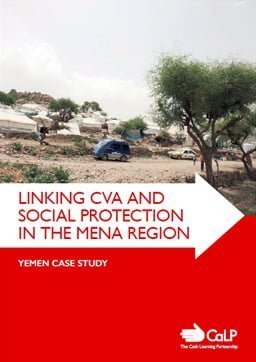
Linking CVA and Social Protection in the MENA Region – Yemen Case Study
Case Study
Building linkages between humanitarian cash and voucher assistance (CVA) and social protection (SP) has become an increasingly prominent topic over the past five years and the Middle East and North Africa (MENA) region has been at the centre of this evolution. The objective of this resource set (the crib sheet and 3, soon to be 6, regional case studies) is to ensure that the CALP Network...

Linking Cash and Voucher Assistance (CVA) and Social Protection – Occupied Palestinian Territories (OPT): Country Summary
Report
This country summary is part of a larger resource set, providing practitioners with examples of different approaches to linking CVA
and social protection.
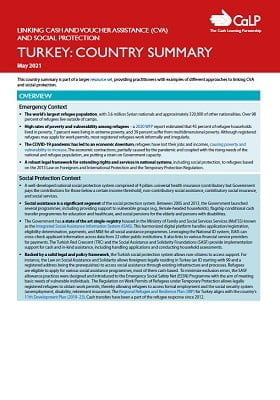
Linking Cash and Voucher Assistance (CVA) and Social Protection – Turkey: Country Summary
Report
This country summary is part of a larger resource set, providing practitioners with examples of different approaches to linking CVA
and social protection.
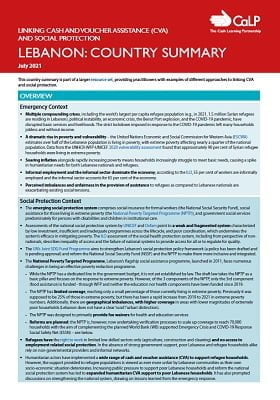
Linking Cash and Voucher Assistance (CVA) and Social Protection – Lebanon: Country Summary
Report
This country summary is part of a larger resource set, providing practitioners with examples of different approaches to linking CVA
and social protection.
Líder temática
Últimos recursos
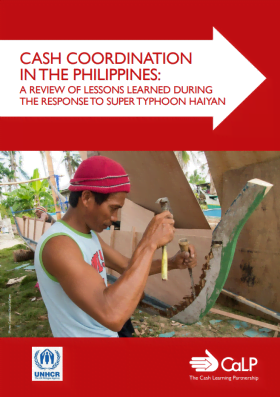
Cash Coordination in the Philippines: A review of lessons learned during the response to Super Typhoon Haiyan
Report
In the last five years there has been a growing trend towards the use of cash transfer programming (CTP) as a response modality in emergencies across the humanitarian sector. The fungibility of cash, when provided without restrictions, offers increased choice for affected populations to...

The Road to Recovery Cash Transfers as an Emergency Response to Nepal’s Earthquake of 2015 and a Catalyst for Consolidating Nepal’s Social Protection Floor
Report
On 27 May, the Nepal Ministry of Finance issued a decision: “Approval of top up cash transfer for early recovery for vulnerable population affected by the Earthquake”. This marks the beginning of a crucial intervention. Proposed interventions: This paper outlines a proposal to address the economic...
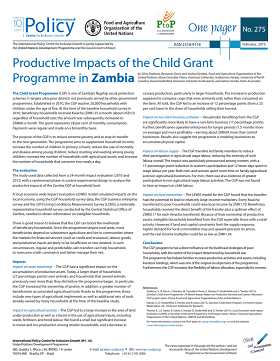
Productive Impacts of the Child Grant Programme in Zambia
Report
This short one page paper looks at the impacts of the Child Grant Programme in Zambia on asset ownership, agricultural activity, non-farm business activities, labour supply and local economies. The CGP is one of Zambia’s flagship social protection schemes. It targets ultra-poor districts not previously...
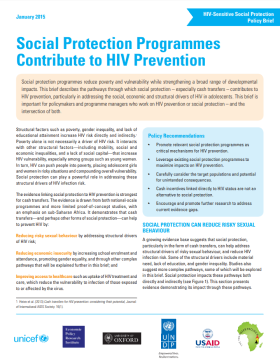
Social Protection Programmes Contribute to HIV Prevention
Policy paper
Social protection programmes reduce poverty and vulnerability while strengthening a broad range of developmental impacts. This brief describes the pathways through which social protection – especially cash transfers – contributes to HIV prevention, particularly in addressing the social, economic and...

Impacts of the Child Grant Programme (CGP) on the Local Economy in Zambia
Report
In this research brief, local economy-wide impact evaluation (LEWIE) simulation methods are used to assess the likely impacts of cash transfers on the local economy. When the Child Grant Programme (CGP) gives money to beneficiary households, they spend it to buy goods and services. As this cash circulates...

Can Emergency Cash Transfers ‘Piggyback’ on Existing Social Protection Programmes?
Policy paper
This background note focuses on the current discussion among actors in the humanitarian and social protection sectors regarding the use of existing social protection programmes to provide an emergency response. It outlines the overlaps between social protection and humanitarian responses, considers a...
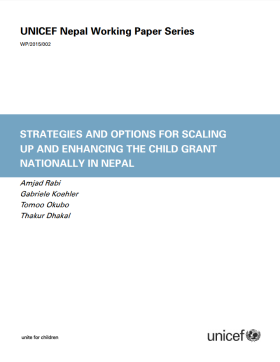
Strategies and Options for Scaling Up and Enhancing the Child Grant Nationally in Nepal
Policy paper
The objective of this study is to offer to the Government of Nepal (GoN) a set of reflections and options regarding the continuation, scale-up and enhancement of the Child Grant (CG), a cash transfer program for children under the age of 5 introduced by the GoN in 2009. While the original intention was to...
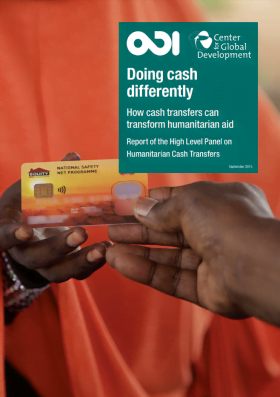
Doing Cash Differently: How cash transfers can transform humanitarian aid?
Policy paper
This report commissioned by the Overseas Development Institute highlights why giving aid directly in the form of cash is often a highly effective way to reduce suffering and to make limited humanitarian aid budgets go further. The publication, ,written by the High Level Panel on Humanitarian...
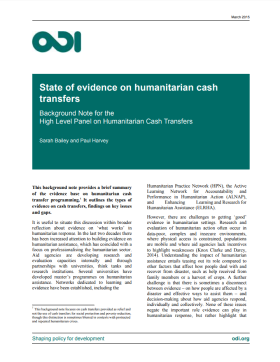
State of Evidence on Humanitarian Cash Transfers
Policy paper
The “State of evidence on humanitarian cash transfers” background note provides a brief summary of the evidence base on humanitarian cash transfer programming. The report also outlines the types of evidence on cash transfers, findings on key issues and gaps. This publication is an output of the...
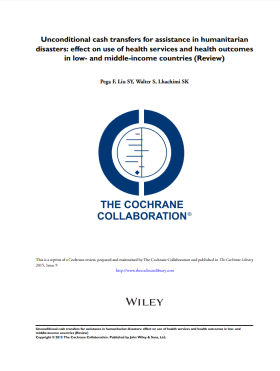
Unconditional Cash Transfers for Assistance in Humanitarian Disasters: Effect on use of health services and health outcomes in low- and middle-income countries
Report
Unconditional cash transfers (UCTs) for humanitarian assistance during disasters may improve health in low- and middle-income countries (LMICs) by giving recipients additional income. This study sought to assess the effect of UCTs on health services use, health outcomes, social determinants of health,...
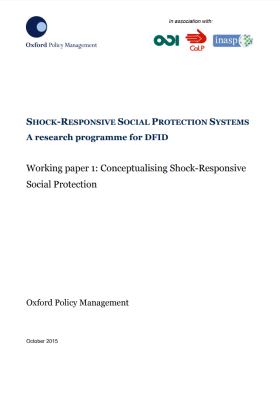
Working Paper 1: Conceptualising shock-responsive social protection
Report
The Shock-Responsive Social Protection Systems study is a two-year, £1 million research programme led by Oxford Policy Management (OPM), in consortium with the Overseas Development Institute (ODI), the the CALP Network and INASP, and funded by the UK Department for International Development (DFID). This...

Factors Affecting the Cost-efficiency of Electronic Transfers in Humanitarian Programmes
Report
Led by Oxford Policy Management (OPM) with support from Concern Worldwide, this research aims to answer the key question: Are electronic transfers more cost-efficient than traditional manual based cash delivery methods, and under what conditions? Cash is increasingly offered to households in...
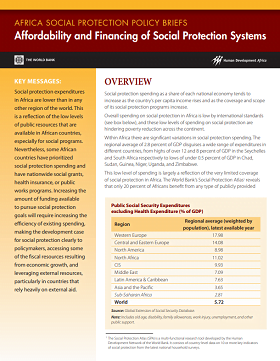
Africa Social Protection Policy Briefs – Affordability and Financing of Social Protection Systems
Report
Social protection spending as a share of each national economy tends to increase as the country’s per capita income rises and as the coverage and scope of its social protection programs increase. Overall spending on social protection in Africa is low by international standards (see box below), and these...

Social transfers in the fight against hunger – A resource for development practitioners
Report
A European Commission Reference Document aims to deepen the understanding of a concept, develop knowledge, provide orientations for aid implementation, and present good practices. This Reference Document is intended as a resource to support the practical integration of social transfers into programmes...
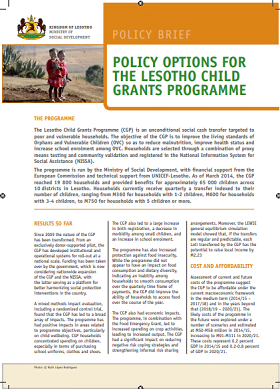
Policy brief – Policy options for the Lesotho Child Grants Programme
Policy paper
The Lesotho Child Grants Programme (CGP) is an unconditional social cash transfer targeted to poor and vulnerable households. The objective of the CGP is to improve the living standards of Orphans and Vulnerable Children (OVC) so as to reduce malnutrition, improve health status and increase school...

Social Transfer Programme in Nepal: An overview
Presentation
A overview of the social transfer programme in Nepal.
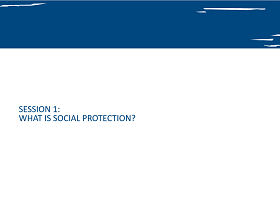
What is social protection?
Report
This presentation was made on behalf of UNICEF at the social protection framework validation meeting that took place at the Jacaranda Hotel in Nairobi, Kenya on 26 September 2014. It looks at components and dimensions of social protection, lessons from global experiences and some limitations of the...

Market Analysis for Preparedness and Development: Piloting Innovation in Guatemala
Report
This case study charts the process, successes and learning from Oxfam’s pilot joint market analysis in Guatemala 2013. One of the key lessons is that, despite the initial reluctance to market based programming approaches, a critical impact of the assessment has been increased interest from other...
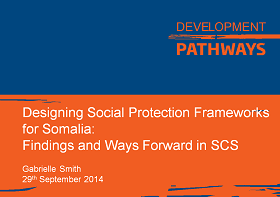
Designing Social Protection Frameworks for Somalia: Findings and Ways Forward in SCS
Report
This presentation was made on behalf of Development Pathways at the social protection framework validation meeting that took place at the Jacaranda Hotel in Nairobi, Kenya on 26 September 2014. It looks at designing social protection frameworks for Somalia and covers: 1.Activities and Methods 2.Macro...
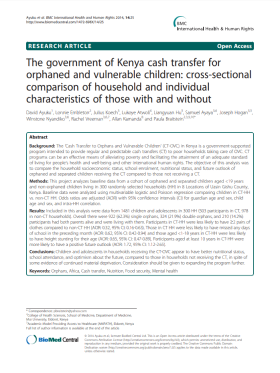
The Government of Kenya Cash Transfer for Orphaned and Vulnerable Children: Cross-sectional Comparison of Household and Individual Characteristics of Those With and Without
Report
The ‘Cash Transfer to Orphans and Vulnerable Children’ (CT-OVC) in Kenya is a government-supported program intended to provide regular and predictable cash transfers (CT) to poor households taking care of OVC. CT programs can be an effective means of alleviating poverty and facilitating the attainment...

